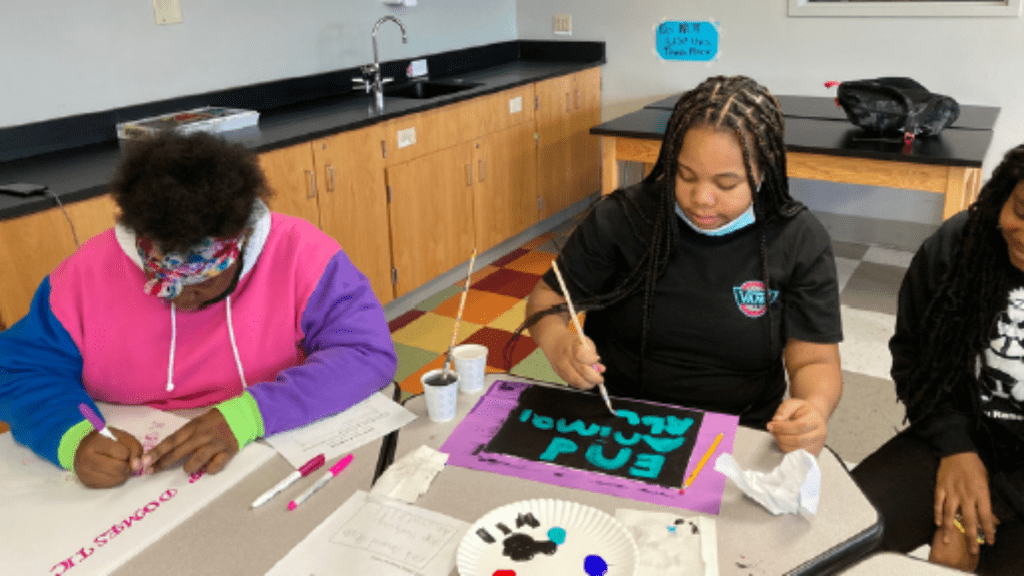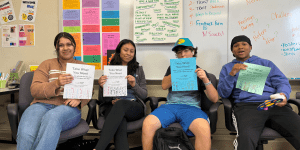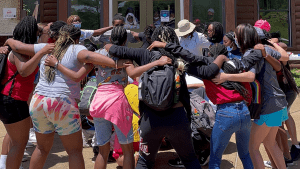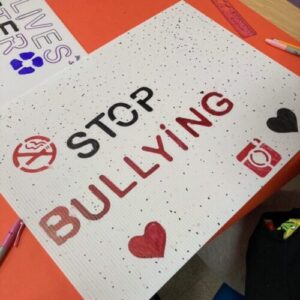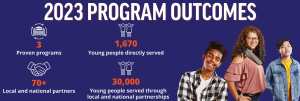By Annie Philipps, MSW, Director of the Teen Outreach Program, and Gabriela Bronstein, MSW, Director of the Teen Outreach Program and Teen Connection Project
Through several blog posts this year, we have called attention to the epidemic of loneliness, isolation, and social disconnection in our country. Youth and young adults are at greatest risk for negative outcomes from this epidemic, and as youth development professionals, we see how dramatically it is impacting teens today.
One way to combat this epidemic is by making sure young people have the skills and opportunities to build positive connections and healthy relationships with peers, adults, and their communities. Through two previous posts, we have explored how the Teen Connection Project and Wyman Leaders each support the development of positive, healthy relationships through unique activities, experiences, and curriculums.
Our third program – the Teen Outreach Program® (TOP®) – is also centered on relationships. TOP celebrates teenagers and supports their growth and development. In the words of our teens, it’s “a place to talk about things teens need to know,” “a place to be yourself” and an opportunity to “have fun while we learn about ourselves.”
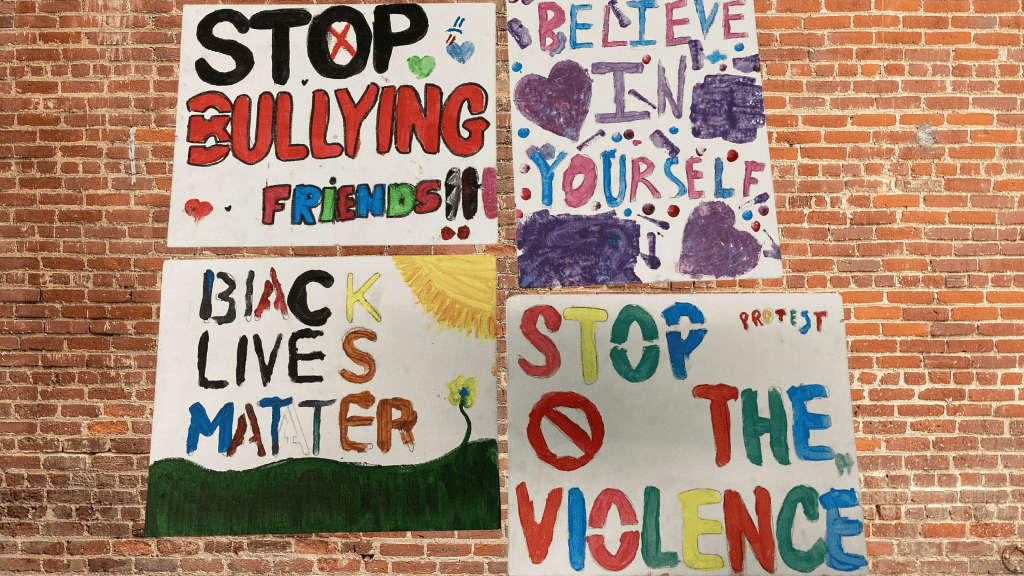
What is the Teen Outreach Program?
The Teen Outreach Program (TOP) is an evidence-based youth development program. It blends curriculum-guided, peer group meetings with meaningful community service activities. It is designed to:
- Build skills, including social and emotional learning;
- Support connections, including relationships with peers, adults, and the community; and
- Develop teens’ confidence and positive sense of themselves.
In TOP Clubs, facilitators build an intentionally safe and supportive atmosphere, and teens come together for lessons and meaningful community service.
The TOP Curriculum includes structured, yet flexible lessons focused on themes like “Building My Skills,” “Learning About Myself” and “Connecting With Others.” The lessons are active and engaging, with a focus on teens’ voices filling the room and exploring the content. Teens may be seen in lively group discussions, moving around the room for an activity, preparing and performing role plays, or completing reflection prompts. Teens are primed for social development, and the TOP Curriculum leans into this with fun and engaging learning opportunities.
In a TOP lesson titled “Building Up,” facilitators lead an activity comparing two stories: one where a character has a tough day and feels unsupported, and a second where the same character receives support from others around them. This activity leads to a conversation about empathy, and teens discuss the difference between “putting down” and “building up” and identify opportunities to support one another. The lesson ends with teens each contributing to the building of a physical tower of index cards or blocks while discussing how empathy can build up our relationships and communities. Teens share that this lesson is easy to understand; they know what it feels like to have a tough day, and they also know how much it means to them when someone supports them. They leave this lesson excited to focus on building one another up, and facilitators find that teens are excited to come back to Club and share examples of how they have built one another up.
TOP teens also participate in meaningful Community Service Learning (CSL), where they make a difference in their communities and, in the process, develop confidence in themselves and their abilities. Teens may serve within their own setting, such as by supporting younger students or beautifying a community space, or they may go into the community to offer their talents to a senior center, animal shelter, or a wide variety of other organizations. As teens do service in the community around them, they experience growth in their self-confidence and positive sense of themselves. As one teen shared, “CSL helped me realize I’m more helpful than I thought I was. Now I prefer to offer to help others instead of waiting to be asked.”
At the end of the year, teens celebrate and reflect on their TOP experience. They talk about what they learned and how they can apply these skills moving forward. They also reflect on how they worked together during lessons and CSL. Teens often identify that while they may not have known one another or been friends before TOP, they now consider themselves friends who support one another. Teens also often thank their facilitators for supporting and being there for them.
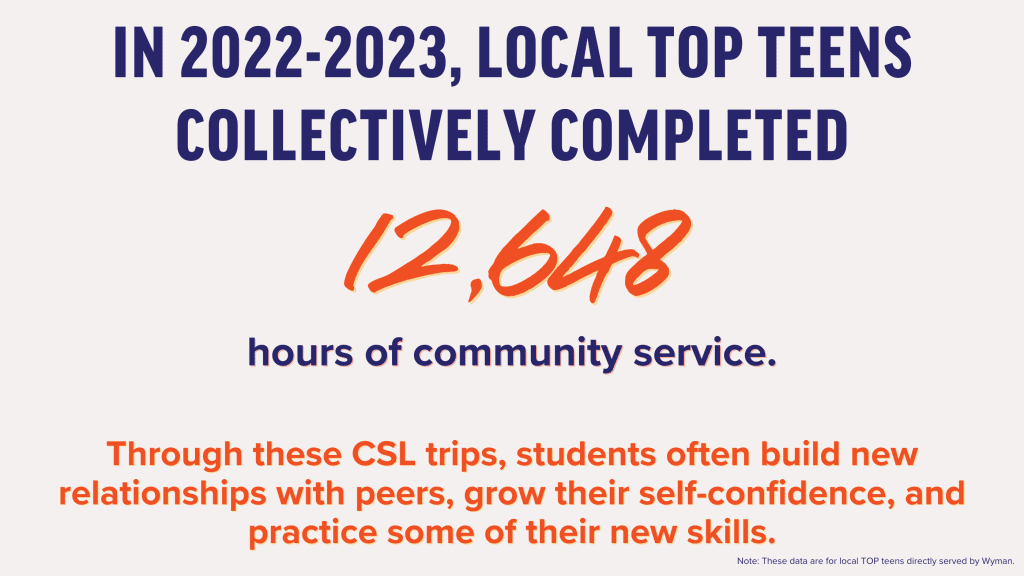
What is the impact of TOP?
TOP lessons are interactive and engaging. Teens learn about and practice skills, like communication and problem solving, each week in their lessons and build their sense of self and confidence through Community Service Learning (CSL). This builds experience and momentum, and they are more likely to practice these skills outside of TOP and are poised to build connections and relationships with those around them.
Research shows that TOP teens demonstrate:
- Improved social and emotional learning skills, including emotion management, empathy, communication, and teamwork;
- A positive sense of self; and
- Stronger connections to others, including strong supportive relationships with adults, positive peer relationships, and school and community engagement.
These outcomes combined lead to improved academics and decreased risky behaviors.
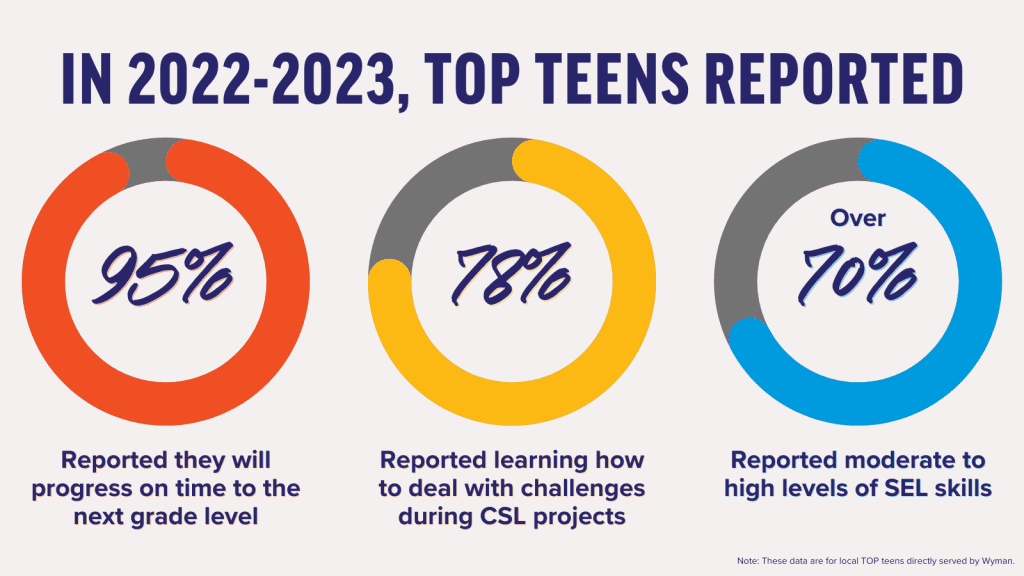
Several factors go into creating this impact:
- Specific lesson content: The topics and design of the lessons allow teens to engage in discussions and practice various skills.
- Training: All TOP facilitators complete a standard 2.5 day training, which includes how to facilitate in a way that supports relationship development.
- Community Service Learning (CSL): CSL is strongly linked to a positive sense of self, which leads growth in teens. The more positively they see themselves, the more their confidence increases and the more likely they are to use their social-emotional skills and engage with others in a pro-social manner.
Additionally, facilitators observe overall growth with the teens. Teens begin to utilize one-on-one time with their facilitators and ask for support when it is needed. They learn to advocate for themselves and others, and start stepping in to leadership roles.
“My co-facilitator and I worked with a teen all year on managing his emotions,” says Arielle Washington, TOP Specialist at Ferguson-Florissant School District. “By the end of the year, he was advocating for what he needed and knew when he needed assistance from others. He would come into the office and tell us how he appreciated TOP and how we never gave up on him. Seeing each youth grow through the entire school year is why I enjoy this work. Everyone involved sees the benefits, and the students see the outcomes in themselves.”
Facilitators also notice the powerful connections that students build. Social development is very important in adolescence, and TOP celebrates this. Facilitators receive training on how to create a group atmosphere where teens feel safe and supported in discussions and activities. As the group explores various topics and does meaningful service together, teens form and strengthen relationships.

TOP’s reach and the importance of reaching more teens
The teens currently in TOP were home during key developmental years because of COVID-19. They often have trouble building connections with their peers, feel isolated, and think no one has experienced the things they have.
TOP is one way we can help them develop important social-emotional skills, learn about themselves, and engage with their communities. It helps them understand that everyone is unique, but there is always someone who has had a similar experience, or who wants to listen to and befriend you.
TOP is delivered locally by Wyman in the Ferguson-Florissant School District and the School District of University City. It is also replicated through our National Network of over 75 youth-serving organizations. It is implemented in schools, after school, in community organizations, and within specialized settings. Currently, about 24,000 teens, in the St. Louis region and nationally, participate in TOP. That number continues to grow because we – and our partners – know that TOP is a great way for teens to start developing a positive sense of self, make healthy decisions, build relationships, and learn social-emotional skills.
Call to Action
We know TOP is one way we can help teens have the skills, experience, and confidence to build healthy, authentic connections and relationships with those around them. We invite you to partner with us to help more teens build and sustain social connections.
- Share this with your network and advocate for the teens in your life. You can make sure social connections and healthy relationships remain a priority by directly supporting the young people you care about, ensuring that the right resources are available to them, and advocating for them with policymakers.
- Give back to your community through a community service project AND create opportunities for teens to volunteer! Community Service Learning is an important part of TOP, helping teens build confidence, engage with their communities, and discover how they can make a difference in the lives of others. We encourage you to do the same: volunteer in your community, speak up about something that is important to you, and make space at community events and service activities for teen volunteers.
- Become a partner and bring the Teen Outreach Program to teens in your community. If you’re interested in learning more about replicating TOP, you can visit TOP | Wyman Center.
- Become a donor to support our programs and our research. Wyman is a non-profit learning organization that creates, delivers, and distributes proven programs to young people. We are always innovating, adjusting, and improving to ensure we meet the needs of the young people we serve. The support we receive from our community helps us continue this work and deliver quality programming. If you are interested in becoming a donor, visit Donate | Wyman Center.


